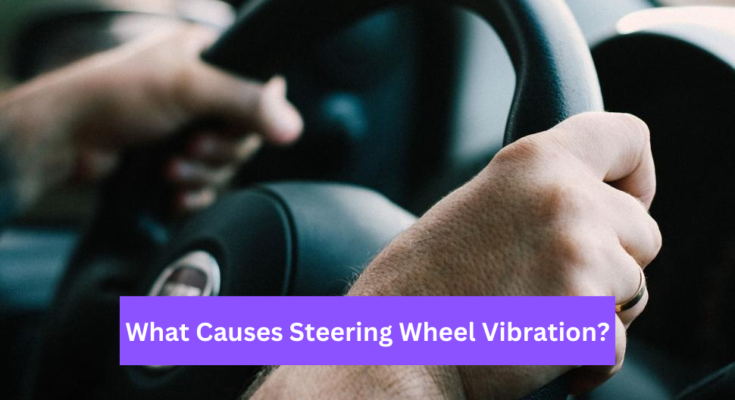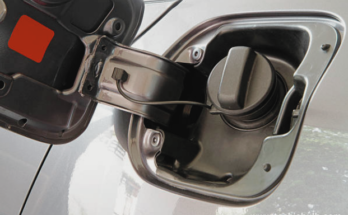Feeling your steering wheel shake? That’s steering wheel vibration, and it’s like your car’s way of saying, “Hey, something’s up!”
What Causes Steering Wheel Vibration? Steering Wheel Vibration can manifest for a variety of reasons, ranging from relatively minor concerns to more significant mechanical issues within a vehicle.
Steering wheel vibration is a phenomenon experienced by drivers when the steering wheel shakes or oscillates unexpectedly. This sensation can be unsettling and may indicate underlying issues with the vehicle. It happens when there are issues with your car’s parts.
One big reason is tire trouble. If your tires aren’t wearing evenly or aren’t properly filled with air, your steering wheel might start to shimmy. So, keep an eye on your tire health – it makes a real difference.
Also, if your wheels aren’t aligned properly, your steering wheel can start acting wobbly. Think of it like your car wanting to go in its own direction. Regular wheel checks help keep things straight.
When brakes get worn out, they can add to the shaky situation. So, make sure your brakes are in good shape for smoother stops.
Other possible troublemakers include your car’s suspension system, drivetrain, and even the power steering. Knowing these basics helps you understand what’s causing the vibrations and how to keep your ride nice and steady. Steering wheel vibes are like your car’s little signals – listen to them, take care of the issues, and enjoy a smoother drive!
Addressing the root cause of these vibrations is crucial not only for the comfort of the driver but also for the overall performance and safety of the vehicle.
In this exploration, we will cover common triggers such as wheel imbalance, misalignment, tire issues, brake problems, suspension components, drivetrain malfunctions, wheel bearing troubles, and steering system anomalies.
Causes of the Steering Wheel Vibration or Shaking
When it comes to driving, a smooth and comfortable experience is paramount. However, for many drivers, the unexpected sensation of the steering wheel vibration can disrupt this harmony. One of the important causes of Steering Wheel Vibrations-
- Understanding Wheel Imbalance
One of the primary culprits behind steering wheel vibration is wheel imbalance. This occurs when the weight distribution among the tires is uneven, leading to an unsettling shake in the steering wheel. Addressing this issue is crucial for maintaining a smooth ride, as imbalanced wheels can intensify vibrations, particularly at higher speeds.
- Navigating Misaligned Wheels
Wheel misalignment is another factor contributing to steering wheel vibrations. When the wheels are not properly aligned, it can result in uneven tire wear and compromised handling. The misalignment can transmit vibrations directly to the steering system, creating an uncomfortable driving experience.
- Tackling Tire Issues
Worn-out or damaged tires play a significant role in steering wheel vibrations. The condition of your tires, including the tread depth and overall health, can impact the smoothness of your ride. Regularly inspecting and maintaining your tires is essential for reducing vibrations and ensuring optimal performance.
- Decoding Brake Problems
Brake-related issues can also be a source of steering wheel vibrations, especially during braking maneuvers. Unevenly worn brake components or warped brake rotors can lead to a pulsating sensation in the steering wheel. Addressing brake problems promptly not only enhances safety but also contributes to a more comfortable driving experience.
- Exploring Suspension Components
The health of your vehicle’s suspension system is critical in preventing steering wheel vibrations. Worn-out shocks or struts can introduce instability, causing the steering wheel to shake. Regular suspension maintenance and timely replacements can significantly reduce the likelihood of vibrations.
- Understanding Drivetrain Influence
Issues within the drivetrain, such as worn-out CV joints or damaged axles, can contribute to vibrations, especially during acceleration. A well-maintained drivetrain is essential for the overall smoothness and performance of your vehicle, minimizing potential disruptions in the steering system.
- Delving into Wheel Bearing Woes
Faulty wheel bearings can be a hidden source of steering wheel vibrations. Keep an ear out for any humming noises accompanying the vibrations, as this may indicate problems with the wheel bearings. Timely replacement can prevent further damage and ensure a smoother ride.
- Nipping Steering System Anomalies in the Bud
The steering system, including power steering components and fluid levels, plays a pivotal role in maintaining control and minimizing vibrations. Regular checks and maintenance of the power steering system can prevent issues that might lead to an uneasy shaking of the steering wheel.
Is it Safe to drive with a Vibrating steering wheel?
Driving with a vibrating steering wheel can be concerning, and whether it is safe depends on the underlying cause of the vibration. In general, it is advisable to address the issue promptly to ensure both your safety and the well-being of your vehicle. Here are some considerations:
- Severity of Vibration:
Mild vibrations: If the steering wheel vibrations are subtle and do not significantly affect your control of the vehicle, it may be safe to drive to a nearby service center for inspection.
Intense vibrations: If the steering wheel shakes vigorously, it is safer to pull over and assess the situation. Continuing to drive in such conditions can compromise your ability to control the vehicle.
- Potential Causes:
Wheel imbalance or misalignment: These issues can often be addressed without immediate risk. However, ongoing vibrations may lead to uneven tire wear and affect handling.
Brake problems: If the vibrations are related to brake issues, such as warped rotors, it’s crucial to address them promptly. Brake problems can compromise your ability to stop safely.
- Driving Conditions:
Consider the road and weather conditions. If the road is wet or slippery, handling issues may be exacerbated by steering wheel vibrations. Exercise caution and reduce speed if necessary.
- Noise or Additional Symptoms:
Pay attention to any accompanying noises or symptoms. If you hear unusual sounds or notice other issues along with the vibrations, it’s a sign that immediate attention is needed.
- Professional Inspection:
Schedule a thorough inspection by a qualified mechanic to identify the root cause of the vibrations. Ignoring the issue could lead to more significant problems over time.
- Safety Precautions:
Always prioritize safety. If you feel that driving with the steering wheel vibrations poses a risk, it is best to pull over to a safe location, turn on hazard lights, and seek assistance.
How to Stop Steering Wheel Vibration or Shaking?
Here’s a step-by-step guide to help you eliminate these unwanted vibrations:
- Check Wheel Balance:
- Professional Inspection: Visit a qualified mechanic to check and balance your wheels. Wheel imbalance is a common cause of steering wheel vibrations, and balancing ensures even weight distribution.
- Inspect Tire Condition:
- Tread and Pressure: Examine your tires for signs of wear, damage, or uneven tread. Ensure that all tires have the correct pressure levels, as imbalances can contribute to vibrations.
- Verify Wheel Alignment:
- Alignment Check: Misaligned wheels can cause steering issues. Have a professional conduct a wheel alignment check and make adjustments if necessary.
- Examine Brake Components:
- Brake Inspection: Unevenly worn brake pads or warped rotors can induce vibrations. Inspect and replace brake components as needed to ensure smooth braking.
- Evaluate Suspension System:
- Shock Absorbers and Struts: Worn-out shocks or struts can lead to steering wheel vibrations. Replace damaged components to enhance stability and reduce vibrations.
- Inspect Drivetrain Components:
- CV Joints and Axles: Drivetrain issues, such as damaged CV joints or axles, can contribute to vibrations during acceleration. Inspect and replace faulty components.
- Check Wheel Bearings:
- Humming Noise: If you hear a humming noise along with vibrations, it may indicate wheel bearing problems. Replace damaged wheel bearings to restore smoothness.
- Verify Power Steering System:
- Fluid Levels and Components: Ensure that the power steering system is in good condition. Check fluid levels and inspect components for any leaks or malfunctions.
- Address Additional Factors:
- Vehicle Loading: Uneven weight distribution in the vehicle can impact vibrations. Balance the load to ensure an even distribution across all wheels.
- Professional Inspection:
- Mechanical Assessment: If steering wheel vibrations persist, consult with a professional mechanic for a comprehensive inspection. They can identify less common issues that may be contributing to the problem.
- Regular Maintenance:
- Scheduled Checks: Implement a routine maintenance schedule, including regular tire rotations, wheel alignments, and brake inspections, to prevent steering issues from recurring.
Conclusion
Steering wheel vibration can stem from various factors within a vehicle’s intricate system. From the commonplace issues of wheel imbalance and misalignment to more nuanced concerns such as brake problems, suspension components, drivetrain influences, and wheel bearing woes, understanding the root causes is key to resolving this unsettling phenomenon.
Regular maintenance, including tire checks, wheel alignments, and brake inspections, plays a crucial role in preventing and mitigating steering wheel vibrations. Timely identification and resolution of these issues not only enhance the driving experience by restoring smooth handling but also contribute to the overall safety and longevity of the vehicle.
When faced with steering wheel vibrations, it is advisable to address the problem promptly. Ignoring these warning signs could lead to more significant issues, affecting not only the steering system but also the overall performance of the vehicle. A proactive approach to vehicle maintenance, coupled with professional inspections when needed, ensures a safer and more enjoyable time on the road.
In the pursuit of a vibration-free drive, the synergy of preventive measures and prompt interventions emerges as the winning formula. By unraveling the complexities behind steering wheel vibrations, drivers can navigate the roads with confidence, knowing that their vehicle is in optimal condition.




